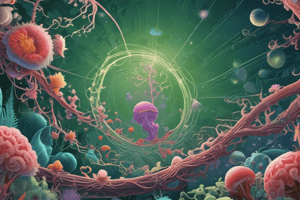Podcast
Questions and Answers
What is the fundamental unit of life?
What is the fundamental unit of life?
- Atom
- Tissue
- Cell (correct)
- Organism
Which branch of biology focuses on the study of microorganisms?
Which branch of biology focuses on the study of microorganisms?
- Cell Biology
- Microbiology (correct)
- Genetics
- Ecology
What does the theory of natural selection explain?
What does the theory of natural selection explain?
- The process by which organisms acquire traits directly from their environment
- The role of random mutations in genetic drift
- Mechanisms by which organisms better adapted to the environment tend to survive (correct)
- How organisms change over time due to non-genetic factors
Which process converts light energy into chemical energy in plants?
Which process converts light energy into chemical energy in plants?
What is the primary purpose of conservation biology?
What is the primary purpose of conservation biology?
Which of the following is a characteristic unique to prokaryotic cells?
Which of the following is a characteristic unique to prokaryotic cells?
What is metabolism primarily responsible for?
What is metabolism primarily responsible for?
Which level of biological classification comes immediately after Kingdom?
Which level of biological classification comes immediately after Kingdom?
Flashcards are hidden until you start studying
Study Notes
Overview of Biology
- Biology is the scientific study of life and living organisms.
- It encompasses various fields such as genetics, ecology, evolution, and molecular biology.
Major Branches of Biology
- Cell Biology: Study of cells, their physiology, structure, and interactions.
- Genetics: Exploration of heredity, genes, and genetic variation.
- Evolutionary Biology: Study of the origins and changes in organisms over time.
- Ecology: Study of organisms' interactions with each other and their environments.
- Physiology: Examination of biological functions and processes within organisms.
- Microbiology: Study of microorganisms, including bacteria, viruses, fungi, and parasites.
Basic Units of Life
- Cell: Fundamental unit of life; can be prokaryotic or eukaryotic.
- Prokaryotic Cells: Lack a nucleus; include bacteria and archaea.
- Eukaryotic Cells: Contain a nucleus; include plants, animals, fungi, and protists.
Important Concepts in Biology
- Homeostasis: Ability of organisms to maintain stable internal conditions despite external changes.
- Metabolism: All biochemical processes within an organism, including anabolism and catabolism.
- DNA and RNA: Molecules responsible for genetic information storage and transfer.
- Natural Selection: Mechanism of evolution where organisms better adapted to the environment tend to survive and reproduce.
Biological Classification
- Organisms are classified into a hierarchy:
- Domain
- Kingdom
- Phylum
- Class
- Order
- Family
- Genus
- Species
Ecosystems and Biodiversity
- Ecosystem: Community of living organisms interacting with their physical environment.
- Biodiversity: Variety of life in a particular habitat or ecosystem; essential for ecosystem resilience.
Key Biological Processes
- Photosynthesis: Process by which plants convert light energy into chemical energy.
- Cell Respiration: Process of converting glucose and oxygen into energy, carbon dioxide, and water.
- Reproduction: Mechanisms by which organisms produce new individuals; includes asexual and sexual reproduction.
Current Trends in Biology
- Biotechnology: Use of living systems and organisms to develop products.
- Synthetic Biology: Design and construction of new biological parts and systems.
- Conservation Biology: Study of preserving biodiversity and protecting endangered species.
Biology: The Study of Life
- Biology is the scientific study of life and living organisms.
- It encompasses diverse fields like genetics, ecology, evolution, and molecular biology.
Core Branches of Biology
- Cell Biology: Focuses on cell structure, function, and interactions.
- Genetics: Studies heredity, genes, and genetic variation.
- Evolutionary Biology: Investigates the origins and changes in organisms over time.
- Ecology: Examines organism interactions with each other and their environment.
- Physiology: Studies the biological functions and processes within organisms.
- Microbiology: Studies microorganisms such as bacteria, viruses, fungi, and parasites.
Fundamental Biological Units
- The basic unit of life is the cell, existing as either prokaryotic or eukaryotic.
- Prokaryotic cells lack a nucleus (e.g., bacteria, archaea).
- Eukaryotic cells possess a nucleus (e.g., plants, animals, fungi, protists).
Essential Biological Concepts
- Homeostasis: Maintaining stable internal conditions despite external changes.
- Metabolism: The sum of all chemical processes within an organism (anabolism and catabolism).
- DNA and RNA: Molecules crucial for storing and transferring genetic information.
- Natural Selection: A mechanism of evolution where organisms best suited to their environment survive and reproduce.
Biological Classification System
- Organisms are categorized hierarchically: Domain, Kingdom, Phylum, Class, Order, Family, Genus, Species.
Ecosystems and Biodiversity
- An ecosystem is a community of living organisms interacting with their physical environment.
- Biodiversity represents the variety of life within a habitat or ecosystem; crucial for ecosystem stability.
Key Biological Processes
- Photosynthesis: Plants convert light energy into chemical energy.
- Cellular Respiration: Glucose and oxygen are converted into energy, carbon dioxide, and water.
- Reproduction: Mechanisms enabling organisms to produce offspring (asexual and sexual reproduction).
Current Directions in Biology
- Biotechnology: Using living systems to develop products.
- Synthetic Biology: Designing and building new biological parts and systems.
- Conservation Biology: Protecting biodiversity and endangered species.
Studying That Suits You
Use AI to generate personalized quizzes and flashcards to suit your learning preferences.




